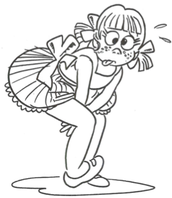 Leaky water works - Incontinence There are many myths about incontinence, which are not necessarily true. For instance many people believe incontinence is an inevitable consequence of ageing or if you drink less it will improve the problem. Neither of these beliefs is helpful. Some facts about our Water Works:
There are two types of incontinence – Stress and Urgency. Stress incontinence With stress incontinence there may be leaking when coughing, sneezing, jumping, lifting, pushing, laughing and pulling. This is caused by weak pelvic floor and urethra sphincter muscles. The trick is to strengthen your pelvic floor and urethral sphincter muscles and tighten your pelvic floor muscles before stressful activity occurs. Urgency incontinence Urgency incontinence is the sudden need to go, for example, when opening the front door you generally get the urge. It’s caused by an overactive bladder, which has been trained to empty before it’s full. Typically small amounts of urine are passed more frequently -10 plus times a day. Preventing or fixing incontinence
For both types of incontinence strengthening your pelvic floor and urethra sphincter are important. To do this:
Once you’ve mastered the pelvic floor exercises, practice regularly eg every time you stop at red lights. Tips for managing and training urgency incontinence When you experience the sudden urgency to pass urine, it is often associated with a feeling of panic. The following may help:
If desperate:
If you are still struggling there is help:
You don’t have to suffer alone - contact us we can help Ph: 03 3775280 Email: [email protected] Web: www.therapyprofessional.co.nz Reference: Women’s Waterworks – Curing Incontinence by Pauline E Chiarelli Comments are closed.
|
AuthorShonagh O'Hagan Archives
July 2024
|

 RSS Feed
RSS Feed